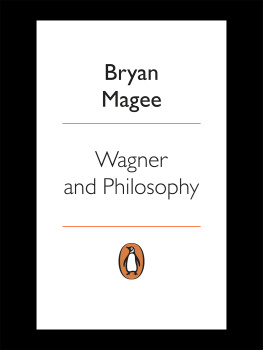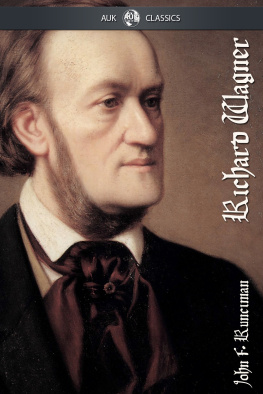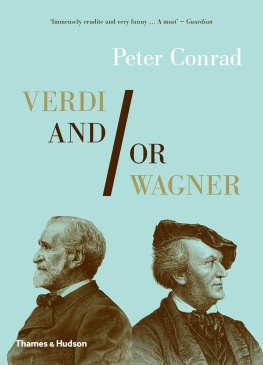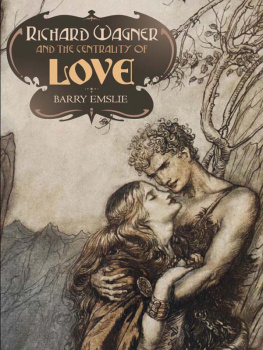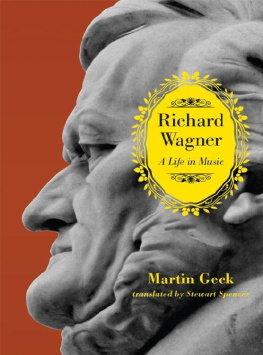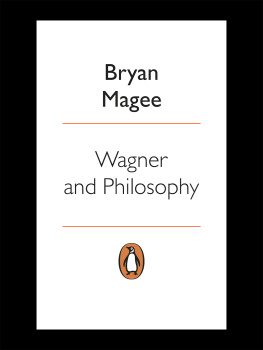PENGUIN BOOKS
WAGNER AND PHILOSOPHY
Bryan Magee has had a many-sided career as a university teacher of philosophy, critic of music and theatre, broadcaster, Member of Parliament and author. His best-known TV programmes are two fifteen-part series on philosophy made for the BBC. Among his books, which together have been translated into over twenty languages, are Aspects of Wagner, The Philosophy of Schopenhauer and Confessions of a Philosopher.
BRYAN MAGEE
Wagner and Philosophy

PENGUIN BOOKS
PENGUIN BOOKS
Published by the Penguin Group
Penguin Books Ltd, 80 Strand, London WC2R 0RL , England
Penguin Putnam Inc., 375 Hudson Street, New York, New York 10014, USA
Penguin Books Australia Ltd, 250 Camberwell Road, Camberwell, Victoria 3124, Australia
Penguin Books Canada Ltd, 10 Alcorn Avenue, Toronto, Ontario, Canada M4V 3B2
Penguin Books India (P) Ltd, 11, Community Centre, Panchsheel Park, New Delhi 110 017, India
Penguin Books (NZ) Ltd, Cnr Rosedale and Airborne Roads, Albany, Auckland, New Zealand
Penguin Books (South Africa) (Pty) Ltd, 24 Sturdee Avenue, Rosebank 2196, South Africa
Penguin Books Ltd, Registered Offices: 80 Strand, London WC2R 0RL , England
www.penguin.com
First published by Allen Lane The Penguin Press 2000
Published in Penguin Books 2001
Copyright Bryan Magee, 2000
All rights reservied
The moral right of the author has been asserted
Except in the United States of America, this book is sold subject to the condition that it shall not, by way of trade or otherwise, be lent, re-sold, hired out, or otherwise circulated without the publisher's prior consent in any form of binding or cover other than that in which it is published and without a similar condition including this condition being imposed on the subsequent purchaser
ISBN: 978-0-14-192937-8
To
Jonathan Glover
I had always felt an inclination to try to fathom the depths of philosophy.
Wagner, My Life, p. 429
CONTENTS
LIST OF ILLUSTRATIONS
PREFACE
When I began work on this book my intention was to write about the influence of philosophy on Wagner's operas. Wagner was the only one of the great composers who studied philosophy seriously over any length of time; and what gives this fact more than passing interest is that the philosophers who were of special importance to him exercised more than a casual influence on his work. In fact their influence on his mature operas was so great that Tristan and Isolde and Parsifal, at least, could not have been recognizably as they are without it; and the same is almost certainly true of The Ring. My original intention, then, was to consider each of the philosophers in question and show in what ways their ideas got into Wagner's work.
That remains my central theme; but as it developed in the course of writing I found it necessary to deal with other things too. Wagner's attitudes to politics were of decisive significance here. In the libretto of The Ring they are probably the most important single ingredient as far as ideas are concerned, and they are intermingled with philosophical ideas. Later, Wagner's disillusionment with politics caused him to turn in on himself, and this opened the way for acceptance of a philosophy which was totally at variance with his former beliefs and which enormously affected his work. None of this can be understood without extensive consideration of his politics which in turn calls for discussion of some of his more general social attitudes. Eventually I found that what I was writing about was his philosophy in the popular as well as the academic sense of that word his attitude to life, to things in general, his Weltanschauung or world-view. But I have investigated it only in so far as it was an influence on his operas. I have not, to give an example, gone into Wagner's proselytizing vegetarianism; but I have discussed the belief about the oneness of all living things, with its consequent requirement of compassion for animals, on which his vegetarianism was based, and which found expression in Parsifal.
Because the book deals with ideas and beliefs in this general philosophical sense it does not attempt to go into such matters as Wagner's studies in medieval German and Nordic legend, or his experiences of other composers' music, or his views about conducting, singing, acting and stage production, despite the fact that he did indeed have strongly held views about all these things which fed massively into his work. Ideas in the familiar general sense are my concern in this book, though they are not by any means the only things that matter to an understanding and appreciation of Wagner's operas.
For many people the most attractive way into this whole subject will be through Wagner's interest in politics. He is a classic example of someone who, when young, is a passionately committed and active left-wing revolutionary, but then becomes disillusioned with politics and turns away from it altogether in middle age. Former comrades who retain their left-wing commitment usually see such a person as moving to the right, and of course some do, they become conservatives. But in most cases this is an uncomprehending way of seeing what is happening. For most such people are not switching from one political allegiance to another, they are becoming disillusioned with politics as such. They are ceasing to believe that the most important of human problems have political solutions. They are acquiring a different sort of outlook on life, one that does not see politico-social issues as primary. And this is what happened to Wagner. He did not move to the right in the sense of becoming a conservative: never at any time in his life was he conservative in his views or attitudes: to the end of his days he remained radically critical of the society he knew, and never from a right-wing point of view. But he became disillusioned, and bitterly so, with the possibilities of idealistic change. The unforgiving bitterness of the disappointed left-winger is a quite different phenomenon psychologically from the curmudgeonliness of the reactionary, even if in elderly people the two often show some of the same symptoms. One is bitterness at the loss of a past, the other bitterness at the loss of a future. What they have in common is dislike of the present, but in one case this is based on traditional values and in the other on the pain of having relinquished hopes for a radically different future. Be all this as it may, Wagner certainly ceased to be a revolutionary, or a socialist, or anything other than a spasmodic and atavistic devotee of the residual values of failed leftism in the later part of his life, without becoming conservative or right-wing or reactionary none of those last three epithets ever applied to him. His significant movement was not from left to right but from politics to metaphysics.
The change was part of an all-embracing shift in outlook. When he was young, Wagner regarded social reality as the whole of reality. He saw no reason to believe that anything existed other than this world; and in this world there was nothing, he thought, higher than humanity. He believed that morals and values were human creations not made separately by each individual for himself, but evolved by humans collectively over successive generations. For this reason he regarded the deeper values and meanings of life as essentially social in character. The highest activity of all was creative art, he believed, and this too he saw as inherently a social activity. The function of serious art, in his opinion, was to reveal to human beings the most fundamental truths about their own innermost nature. But because this innermost nature was that of an essentially social being, an understanding of it called primarily for an understanding of the relationship of the individual to society.
Next page
